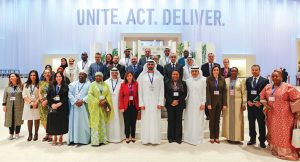DUBAI / WAM
Marking a historic milestone in acknowledging the role of culture in combating and adapting to climate change, high-level delegates from around the globe convened at the 28th UN Climate Change Conference (COP28) in Dubai. The Group of Friends of Culture-Based Climate Action (GFCBCA) at the United Nations Framework Convention on Climate Change (UNFCCC) was officially announced by its co-chairs, Salem bin Khalid Al Qassimi, UAE
Minister of Culture, and Margareth Menezes, Minister of Culture of Brazil. This new coalition, comprising 33 countries and UN agencies, advocates for recognising the integral role of culture in climate change policies. It aims to generate political momentum for effective, cohesive, and coordinated global action, formally acknowledging the significance of culture and heritage in climate initiatives. The unveiling of the Emirates Declaration on Culture-Based Climate Action also took place at the meeting. In attendance was Mariam bint Mohammed Almheiri, Minister of Climate Change and the Environment. The declaration emphasises that today’s challenges are not only financial, technical, and scientific but cultural as well. It asserts that addressing climate change and achieving the Paris Agreement’s goals necessitate inclusivity and collaboration across all sectors, notably culture.
The declaration further stresses the need to fully realise the Paris Agreement’s long-term objectives, including mitigation, adaptation, loss and damage, and climate-resilient sustainable development, by focusing on cultural heritage, arts, and creative industries as catalysts for transformative climate action. It highlights the urgent need for cultural sectors, including institutions and heritage sites, to adapt and evolve in response to climate change. Commenting on the Declaration and the GFCBCA launch, Salem Al Qassimi remarked, “Climate change is reshaping not only our environmental but also our social and cultural ecosystems. It’s creating a cultural emergency by disrupting communities’ abilities to maintain their cultural heritage. Culture-based climate action offers a powerful, inclusive solution, helping to fulfill the Paris Agreement’s objectives.”
Menezes said, “A cultural asset as strong as culture cannot be left out of the fight against climate change on the planet.” “Our presence also reinforces a commitment that is assumed by our president Lula to emphasise that we need, in a responsible and concrete way, to place the climate agenda in multilateral debates. She concluded, “Brazil is a relevant country for the environmental agenda. We have a large part of the planet’s forests and many technological solutions that can be adopted to address the climate issue.”
The Emirates Declaration aims to mainstream culture into climate action and embed it within cultural policies and activities related to heritage, arts, and creative industries. It also seeks multi-level collaboration involving governments, institutions, the private sector, creative industries, indigenous communities, and local knowledge holders.
Almheiri emphasised, “The reality is that our culture – tangible or intangible – is too often one of the silent victims of climate change. However, some of the very best examples of climate solutions are themselves drawn from unique cultural learnings, traditions, and wisdom. In our effort to keep 1.5 alive, we must harness culture in all its forms.”
The Group of Friends will amplify culture and heritage-based strategies to enhance resilience and support sustainable communities, focusing on those most affected by climate change, including artists and heritage professionals.
Looking ahead to COP29 and COP30, the GFCBCA aims to facilitate greater cultural integration in future COPs and the broader UNFCCC framework, potentially leading to Joint Work on Culture and Climate Action. The group also plans to promote culture-based climate action globally and regionally, sharing knowledge and forging partnerships to address the climate crisis.
 The Gulf Time Newspaper One of the finest business newspapers in the UAE brought to you by our professional writers and editors.
The Gulf Time Newspaper One of the finest business newspapers in the UAE brought to you by our professional writers and editors.
